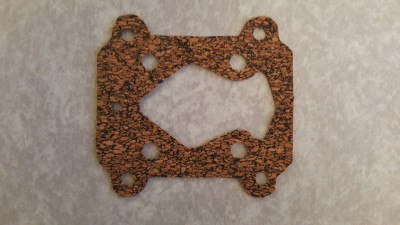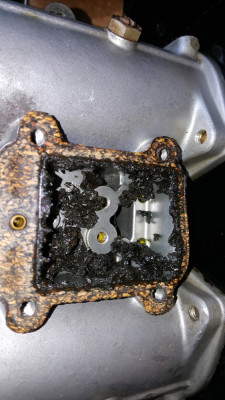E10 fuel and fuel pump diaphragm
16 posts
• Page 1 of 2 • 1, 2
With the introduction of E10 fuel in the UK, should I be concerned about the diaphragm in the standard Ford mechanical fuel pump? If the diaphragm perforates it can leak petrol into the sump, contaminating the oil. If the leak is small and pump pressure still adequate this could continue for some time unnoticed with the potential to cause excessive wear?
I have been using Ethanolmate additive in my fuel since the introduction of E5 petrol but, as I understand it, this additive only protects against corrosion and assists fuel stability, it does not help with so called 'material incompatibilities'.
I am also concerned about the gasket to sender in the fuel tank. I replaced my tank a few years ago and recall that the replacement alloy tank had a cork gasket and cork is most certainly incompatible with Ethanol.
Any thoughts?
Vernon
I have been using Ethanolmate additive in my fuel since the introduction of E5 petrol but, as I understand it, this additive only protects against corrosion and assists fuel stability, it does not help with so called 'material incompatibilities'.
I am also concerned about the gasket to sender in the fuel tank. I replaced my tank a few years ago and recall that the replacement alloy tank had a cork gasket and cork is most certainly incompatible with Ethanol.
Any thoughts?
Vernon
Elan S2 26/5614
Alfa Romeo Alfetta Berlina 1974
Westfield 7SE
Alfa Romeo Alfetta Berlina 1974
Westfield 7SE
- quaybook
- Second Gear

- Posts: 128
- Joined: 24 Aug 2009
I used to manage a synthetic rubber manufacturing plant  does that qualify
does that qualify 
You just need to find out what the diaphram is made of and then determining ethanol resistance is easy. Most of the likely candidates have good resistance so I would not worry to much
see link below
https://mykin.com/rubber-chemical-resistance-chart-3
cheers
Rohan
You just need to find out what the diaphram is made of and then determining ethanol resistance is easy. Most of the likely candidates have good resistance so I would not worry to much
see link below
https://mykin.com/rubber-chemical-resistance-chart-3
cheers
Rohan
-

rgh0 - Coveted Fifth Gear

- Posts: 8417
- Joined: 22 Sep 2003
quaybook wrote:With the introduction of E10 fuel in the UK, should I be concerned about the diaphragm in the standard Ford mechanical fuel pump? If the diaphragm perforates it can leak petrol into the sump, contaminating the oil. If the leak is small and pump pressure still adequate this could continue for some time unnoticed with the potential to cause excessive wear?
I have been using Ethanolmate additive in my fuel since the introduction of E5 petrol but, as I understand it, this additive only protects against corrosion and assists fuel stability, it does not help with so called 'material incompatibilities'.
I am also concerned about the gasket to sender in the fuel tank. I replaced my tank a few years ago and recall that the replacement alloy tank had a cork gasket and cork is most certainly incompatible with Ethanol.
Any thoughts?
Vernon
I would not worry about cork and ethanol either --- at least it seems OK in my wine bottles with 14% ethanol and brandy with around 40%
cheers
-

rgh0 - Coveted Fifth Gear

- Posts: 8417
- Joined: 22 Sep 2003
If not omnipresent, at least of infinite wisdom!
- Witofthestaircase
- First Gear

- Posts: 27
- Joined: 26 Sep 2010
Vernon,
My understanding is that most cork gaskets are bound with nitrile rubber. A quick look at a chemical compatibility chart shows that FKM rubber (Viton)(a DuPont trade name) is comparable with an alcohol/gasoline mixture. Don’t dash out and have a gasket made from this stuff, get a sample and test it first.
Hope this helps,
Richard Hawkins
My understanding is that most cork gaskets are bound with nitrile rubber. A quick look at a chemical compatibility chart shows that FKM rubber (Viton)(a DuPont trade name) is comparable with an alcohol/gasoline mixture. Don’t dash out and have a gasket made from this stuff, get a sample and test it first.
Hope this helps,
Richard Hawkins
- RichardHawkins
- Coveted Fifth Gear

- Posts: 1276
- Joined: 05 Jul 2008
I too am not that convinced about the worries regarding Ethanol in fuel.
Looking at one of my reference books regarding material resilience to different chemicals.
Ethanol if classified as Ethyl Alcohol has zero effect on Viton, Neoprene and Buna-N (common sealing materials). In fact stainless steel and Aluminium are slightly less resistant to it (but still good).
Petrol on the other hand is a lot more destructive and will destroy Neoprene and Buna-N.
The only way extra Ethanol would affect anything is if it reacts with the petrol and forms something like an Acetate, Chlorine, Oxide or a Glycol.
Any chemists able to clarify
Looking at one of my reference books regarding material resilience to different chemicals.
Ethanol if classified as Ethyl Alcohol has zero effect on Viton, Neoprene and Buna-N (common sealing materials). In fact stainless steel and Aluminium are slightly less resistant to it (but still good).
Petrol on the other hand is a lot more destructive and will destroy Neoprene and Buna-N.
The only way extra Ethanol would affect anything is if it reacts with the petrol and forms something like an Acetate, Chlorine, Oxide or a Glycol.
Any chemists able to clarify
1972 Elan Sprint FHC
- cliveyboy
- Fourth Gear

- Posts: 595
- Joined: 22 Sep 2003
For those of us in the UK … according to their website, ESSO Synergy Supreme 99 is still ethanol free in most parts of the country although the pumps are required to be labelled as up to 5%.
- persiflage
- Second Gear

- Posts: 178
- Joined: 24 Jul 2005
16 posts
• Page 1 of 2 • 1, 2
Total Online:
Users browsing this forum: No registered users and 39 guests


